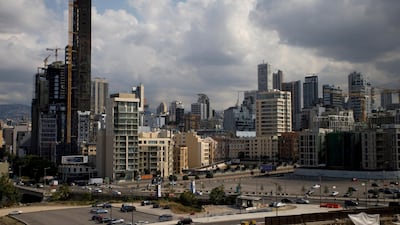A friend once told me “Whatever comes before the ‘but’ in a sentence is meaningless”.
Since then I have been vexed by doubt, every time I tee-up a sentence with the conjunction whose sole purpose is to change “direction”. Why not just go straight to the final clause and be done with the redundancy? Just wait. You’ll start doing it too.
More of the "but" later. In the meantime, I have just come back from four days in Lebanon where I chaperoned 13 British and one American tourist, all were visiting for the first time except one very glamorous woman in her 60s who had been a cabaret dancer at the Casino du Liban in its heyday and even she recognised very little, given what’s happened to the country in the intervening years.
All were affluent and, mostly, what the demographic people like to call, “empty nesters”, fitting the profile of the sort of western long-haul traveller Lebanon claims it has been trying to woo for the past 25 years. The Arab tourists may be loyal and free spending but they tend to stay within their comfort zones and not overly burdened by the need to seek out millennia-old structures, visit sites of religious importance or traipse around the mountains for a day’s hike to visit a remote bee keeper.
The Europeans, on the other hand, have a tradition of going the extra yard and their presence could bring a degree of economic sustenance to those in Lebanon’s cottage industries trying to make a living. My lot were mainly interested in being watered and fed for three days and on that score Lebanon didn’t disappoint. It ticks all the boxes. It’s a country with 300-plus days of sunshine populated by friendly, multi-lingual people and stuffed to the gills with living history while serving vast quantities of delicious, healthy food, all within one to two hour drive from the capital Beirut.
_______________
Read more:
Lebanon also suffering amid plight of Syria's dispossessed
Lebanon's arrest decision frames missed opportunities
_______________
So here’s the “but”: there are aspects of Lebanon for which the westerner will not be prepared, things that if the country truly wants to punch above its weight, we really need to take on board. This trip offered me a valuable opportunity to see how people visiting for the first time react to those shortcomings to which we are all too often blind and which can negate all the plus points.
Driving is the obvious one. I really don’t think the Lebanese appreciate just what bad drivers they are. They may reassure the petrified foreigner by telling them the story of the Swiss traffic expert brought over to study our driving habits and who, after three days, left town in a state of severe agitation, advising us not to change anything or there would be mayhem. It’s a cute story containing, no doubt, more than a grain of truth but we have far exceeded a driving culture defined by quaint national temperament and reached a stage where natural selection on a Malthusian scale exists on our roads. Sadly, it will take a generation and draconian law enforcement to resolve it.
Unless, of course, we can invest in a modern system of public transport. Almost all the guests pointed out that a high proportion of cars during the rush hour had only one occupant. It is a sobering realisation, especially when you’re in a coach that can carry 20 passengers, just how much more space there would be if more people took the bus to work or carpooled.
Another huge, not to mention embarrassing, problem is the litter. Only the unthinking and the blinkered can claim that Lebanon is still a beautiful country. Driving from Beirut to the Bekaa Valley, I squirmed in my seat as I heard the regular “tsk tsk” of disappointment from the back of the coach as we passed piles upon piles of trash by the side of the road. I have said in these pages many times that the modern traveller has so many options, so why would they choose a country that takes no pride in its appearance. I told them it was an unfortunate hangover from the Ottoman Empire when the Lebanese swept all their waste into the street to annoy their Turkish rulers - but all that ended nearly 100 years ago. My next excuse was that Lebanon was more “a state of mind” than a visual delight. Not sure how that went down.
Lastly, and I’m sure most Lebanese don’t really stop to think about this, there are very few people walking the streets of Beirut and tourists, especially those from the West find it odd. The sidewalks, rather like the Dodo, have disappeared in some sort of Darwinian process that has seen them shrink or expropriated by parked cars, a situation that at one point forced many of my charges on to the road in the face of oncoming traffic.
This sense of emptiness was highlighted when I took them on a walking tour of the Beirut Central District, supposedly the beating heart of the Lebanese capital and where they presumably expected to experience a bit of bustle and where all they got were a few parking attendants, soldiers and concierges. It was only when we reached Martyr’s Square, the city centre, that there was any real sign of genuine urban life.
But – that word again – as one of the guests told me on the last night “this has been one of the best trips ever”, I guess it cuts both ways.

